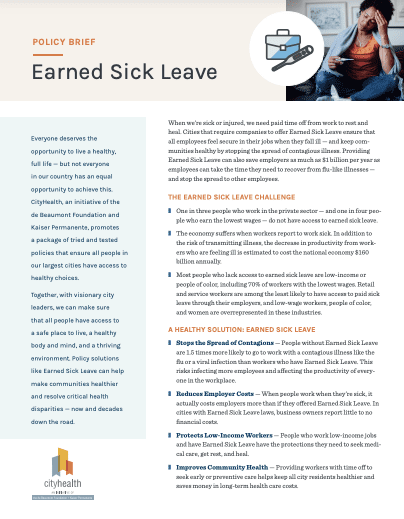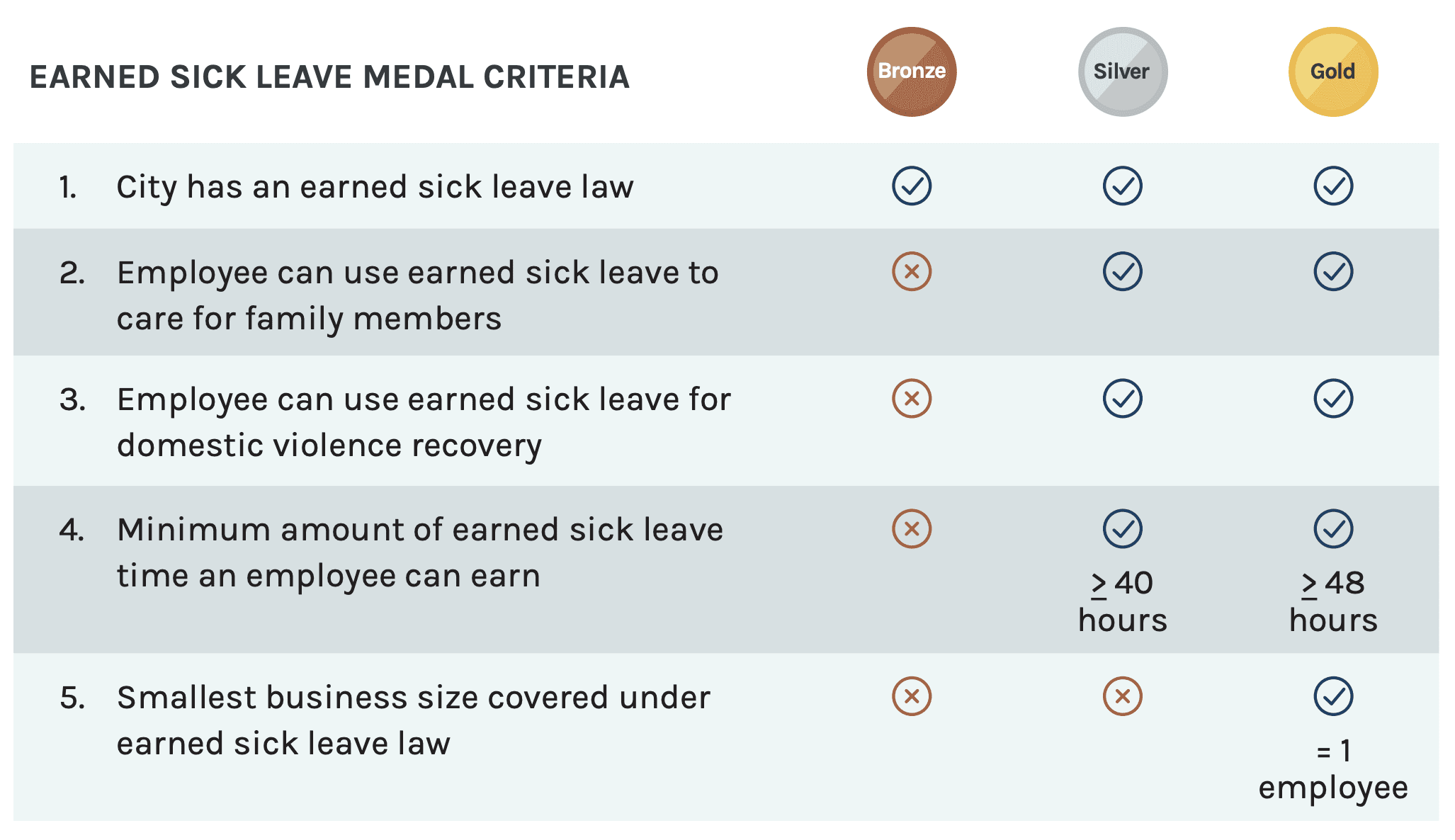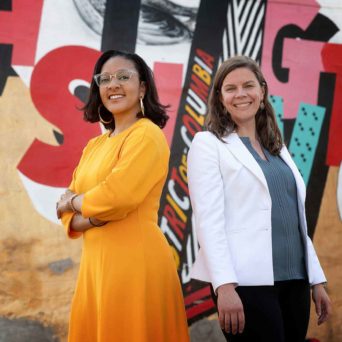This is the latest blog in CityHealth’s monthly series exploring the 2.0 policy package. Sign up for our newsletter to learn about our new policy solutions, tools, and resources.
By Katrina Forrest, J.D., and Catherine Patterson, MPP, CityHealth’s co-executive directors
It’s winter, which means that many cities are seeing a seasonal rise in viral infections — including the flu, the common cold, and a new wave of COVID-19. When someone gets sick, it’s important to take the time needed to get better and prevent spreading illness to others. But for millions of workers who don’t have the ability to take paid time away from work, getting sick can mean facing an impossible choice: either forgoing critical wages (and possibly risking job loss) to stay home and recover, or going to work sick and risking their own health and that of their coworkers and the public.

Download CityHealth’s 2.0 policy brief on Earned Sick Leave
This month, we’re continuing our series on CityHealth’s new 2.0 policy package with a look at Earned Sick Leave. Earned Sick Leave was included in our inaugural policy package in 2017 in part due to a strong evidence base suggesting the policy can reduce the spread of workplace illnesses, protect lower income populations, and increase productivity and economic growth. When the pandemic struck in 2020, Earned Sick Leave took on a new urgency as workers and families needed to take time off for testing, recovery from illness, child and elder care closures, vaccination, and recovery from side effects of vaccination.
As we prepare to enter the third year of living with COVID-19, Earned Sick Leave policies remain a critical protection that can help residents live healthy, full lives. While some states and localities passed COVID-related, time-limited, or supplemental Earned Sick Leave policies, permanent policies are critical to ensure workers can care for themselves and their families while maintaining their economic security. In 2021, CityHealth awarded 23 of 40 cities with Earned Sick Leave medals. Although challenges such as preemption (the practice of a higher level of government superseding a lower level of government) remain a barrier for many cities, there is a rich opportunity for many cities to adopt Earned Sick Leave policies.

The Challenge: Not Enough Workers Can Take Time Off
Far too few workers can access paid time off, and the consequences can be devastating. Nearly one in four private sector workers — 23% — lack access to even a single earned sick day. For communities of color, access to Earned Sick Leave is even more elusive: 36% of Black workers and 48% of Latinx workers report having no paid time away from work of any kind. These data are particularly dire given that racial wage and wealth disparities have resulted in Black and Latinx households having far fewer resources to draw upon during an unexpected loss of income.
Without Earned Sick Leave protections, getting sick can have serious economic consequences. For low-wage workers, just three days of lost pay can be the equivalent to losing an entire month’s budget for groceries or utilities. If an illness causes a worker to miss 6.5 days of work, they could lose the income equivalent to a monthly rent or mortgage payment. With so much at stake, it should come as no surprise that workers without Earned Sick Leave are 1.5 times more likely to report going to work while sick with a contagious illness like a cold or flu. This is especially true for jobs that interact frequently with the public, such as people working in food service or at childcare centers. These are among the occupations least likely to provide Earned Sick Leave to workers, creating environments where employees risk infecting others when they are forced to go to work sick.
Not having Earned Sick Leave also creates a significant barrier to health care access. Workers without these protections are three times more likely to neglect medical care for themselves, and are nearly two times more likely to forgo medical care for their families. Delaying medical care can lead to prolonged illnesses and turn minor health problems into major, more costly ones. Providing Earned Sick Leave to workers could save the U.S. more than $1.1 billion per year in preventable emergency room visits, with nearly half of the costs coming from taxpayer-funded programs like Medicaid, Medicare and the State Children’s Health Insurance Program.
A Tried and Tested Policy Solution
Fortunately, cities, counties, and states across the country have stepped up to require Earned Sick Leave protections. A total of 37 jurisdictions have adopted these laws, including 13 states, 20 cities and four counties — and residents are already seeing the benefits to their health. A recent study found that the general flu rate in jurisdictions with Earned Sick Leave protections decreased by up to 6.5% after the laws took effect. After passing its Earned Sick Leave law, Connecticut saw a faster decline in occupational injuries and illnesses in jobs covered by the law compared to rates for those same occupations in neighboring states.
Unfortunately, 19 states have preempted local Earned Sick Leave policies by either prohibiting or undoing local laws. A recent example of this can be found in Texas. In March 2021, a federal district court blocked an earned sick leave ordinance in Dallas, ruling that the city’s policy was preempted by Texas’ minimum wage law. State district courts have also issued similar rulings for Austin and San Antonio’s Earned Sick Leave ordinances. In these three cities alone, nearly 4 million people lost their guaranteed access to these essential protections.
Cities considering Earned Sick Leave policies should be aware of the potential impacts to low-income and vulnerable workers and structure their laws in ways that can address inequalities and promote equity. Laws should be written to cover a broad range of health-related purposes, including dealing with one’s own illness (including mental health needs), caring for a family member, and accommodate special needs related to domestic violence. Earned Sick Leave policies should cover all employers, regardless of size or industry, as well as cover all workers, including non-traditional workers. Finally, these policies should offer a sufficient amount of earned leave, as offering a greater amount of time off is especially critical for workers with greater health needs, including workers with disabilities or chronic health conditions, new parents, and workers of color.

Seattle Leads in Earned Sick Leave Protections
In 2012, Seattle implemented its Earned Sick Leave law, helping tens of thousands of workers access paid time off when they or a family member was ill. The ordinance passed with the support of a diverse range of stakeholders, including many small businesses who spoke out in support of the ordinance. Seattle’s leadership in Earned Sick Leave policies and the success of its law — both in its effectiveness at providing economic security to workers and creating healthy workplaces — paved the way for the state of Washington to implement a statewide law in 2018. In 2020, during the COVID-19 pandemic, Seattle again led the way by expanding its paid sick leave requirement to cover gig workers, such as those driving or making deliveries for app-based platforms.
Earning CityHealth Gold: Earned Sick Leave
Later this year, CityHealth will assess the nation’s largest 75 cities on their Earned Sick Leave policies. Cities can earn a gold, silver, or bronze medal based on how the city performs on five key criteria:

CityHealth is a resource for city leaders, policymakers, and advocates pursuing policy change that can help all residents live healthy, full lives. Have a question about Earned Sick Leave or any of our other policies? Please feel free to send us an email, and join us to learn more about the tools, research, and technical assistance opportunities from CityHealth and our partners.



 Katrina Forrest, J.D., is Co-Executive Director of CityHealth. Learn more about Katrina
Katrina Forrest, J.D., is Co-Executive Director of CityHealth. Learn more about Katrina  Catherine Patterson, MPP, is Co-Executive Director of CityHealth. Learn more about Catherine
Catherine Patterson, MPP, is Co-Executive Director of CityHealth. Learn more about Catherine 

